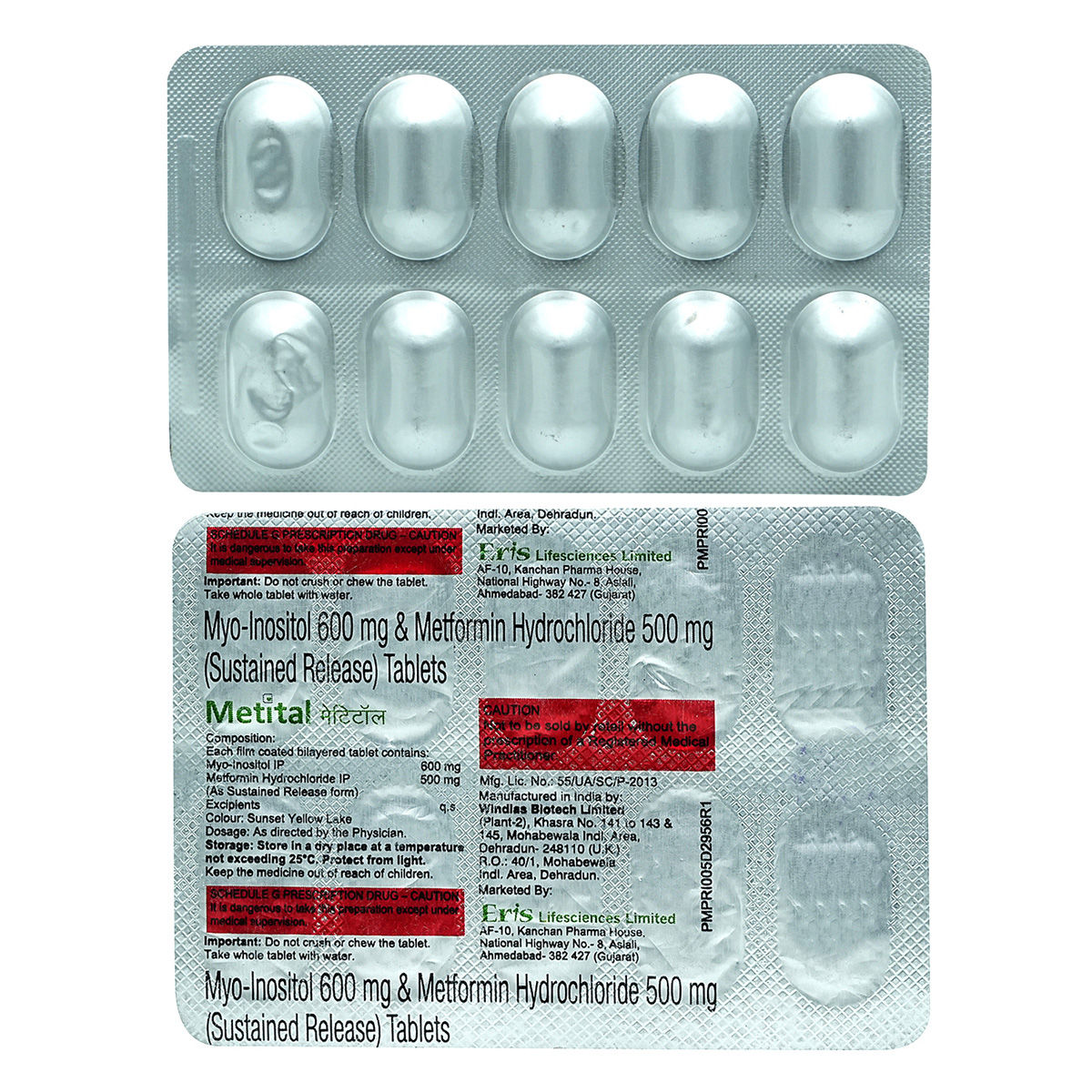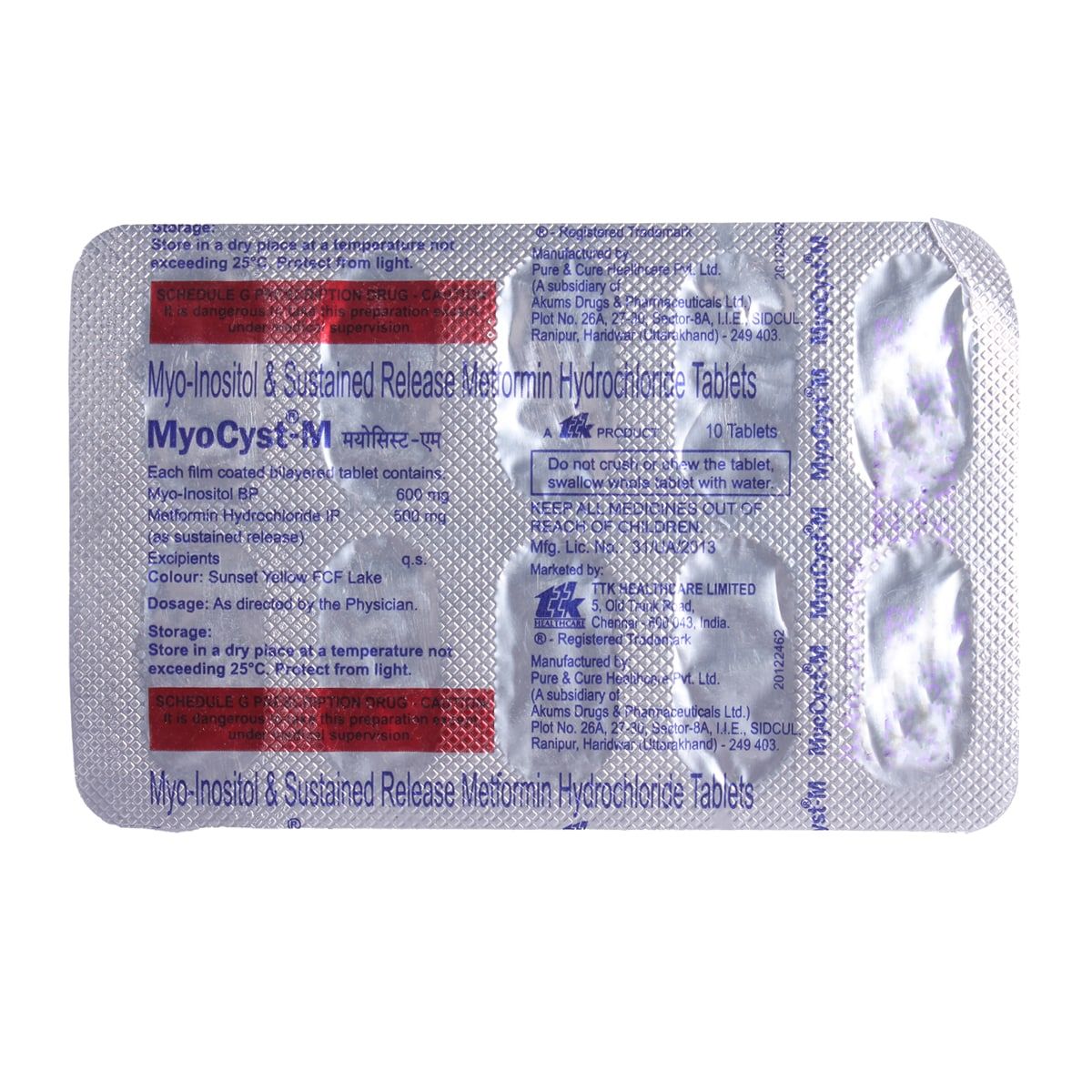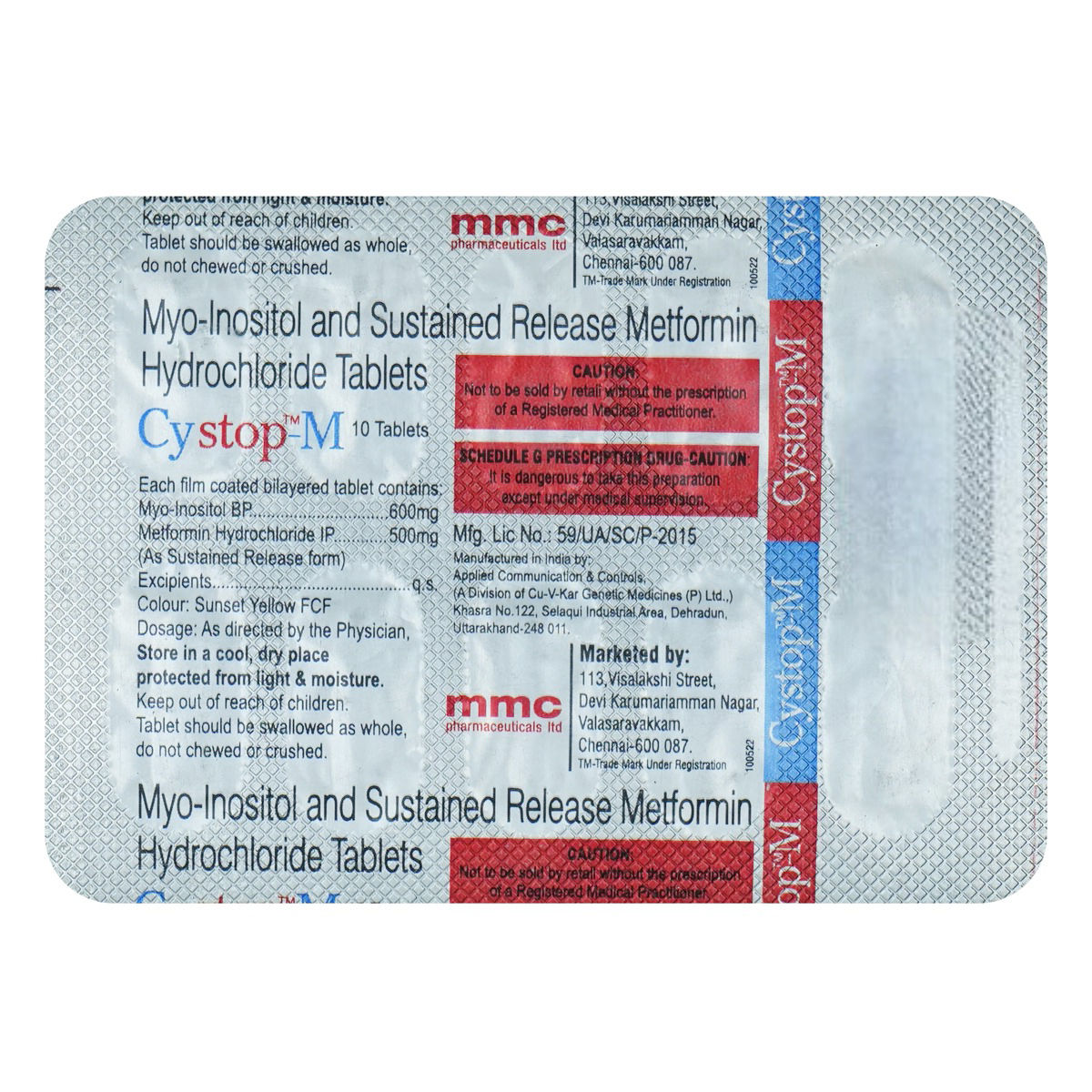Inositol+metformin
About Inositol+metformin
Inositol+metformin is a combination medicine used to treat polycystic ovary syndrome (PCOS). Polycystic ovary/ovarian syndrome is a hormonal disorder that causes enlarged ovaries with numerous small follicles. Symptoms include irregular periods, excess hair growth, acne, and obesity.
Inositol+metformin is composed of two medicines, Inositol and Metformin. Inositol is a vitamin (vitamin B8) like substance. It reduces blood glucose levels and improves ovulation in women with PCOS. Metformin is an antidiabetic medicine that belongs to the class of biguanides. The majority of women with PCOS have higher insulin levels. Metformin is an insulin sensitizer that improves insulin sensitivity (body cells utilize insulin effectively to produce glucose) and thus increases the effects of insulin.
Your doctor will decide the dose and duration based on your medical condition. The common side effects of Inositol+metformin include nausea, taste changes, diarrhoea, dizziness, stomach pain, and loss of appetite. Although not everyone experiences these side effects, please seek medical attention if they occur.
Before starting Inositol+metformin, let your doctor know if you have any medical history of heart, kidney and liver diseases. Pregnant and breastfeeding women should consult their doctor before starting Inositol+metformin. Inositol+metformin may affect your blood sugar levels, which can alter your driving ability; hence, do not drive or operate machinery until you feel better. It is not recommended to consume alcohol along with Inositol+metformin. Inositol+metformin is not recommended in children younger than ten years of age.
Uses of Inositol+metformin
Medicinal Benefits
Inositol+metformin is used to treat polycystic ovary/ovarian syndrome. It consists of Inositol and Metformin. Inositol is a vitamin-like substance. It is naturally found in many plants and animals. It reduces blood glucose levels and improves ovulation in women with PCOS. Metformin is an antidiabetic medicine that belongs to the class of biguanides. The majority of women with PCOS have higher insulin levels. Metformin is an insulin sensitizer that improves insulin sensitivity (body cells utilize insulin effectively to produce glucose) and thus increases the effects of insulin. This further decreases the inflammation in the PCOS condition and regularizes the ovulation process.
Directions for Use
Storage
Side Effects of Inositol+metformin
- Nausea
- Changes in taste
- Diarrhoea
- Dizziness
- Stomach pain
- Loss of appetite
Drug Warnings
Before starting Inositol+metformin, let your doctor know if you have any medical history of mental disorders, thyroid diseases, hypervitaminosis D (high levels of vitamin D), hypercalcaemia (high levels of calcium in the blood), ketoacidosis (excess blood acids), tumours, and pernicious anaemia (decrease in red blood cells due to low vitamin B12). Metformin in Inositol+metformin has an increased risk of lactic acidosis (a rare but serious metabolic complication of excess lactic acid in the blood caused by metformin accumulation). The risk of lactic acidosis is high in older people with kidney, liver and heart diseases. Pregnant and breastfeeding women should consult their doctor before starting Inositol+metformin. Inositol+metformin may affect your blood sugar levels, which can alter your driving ability; hence, do not drive or operate machinery until you feel better. Avoid consuming excessive alcohol, as it can potentiate lactic acidosis.
Drug Interactions
Drug-Drug Interaction: Inositol+metformin may interact with medicines used to treat high blood pressure (propranolol, metoprolol), pain killers, anti-depressants (fluoxetine, amitryptiline), cholesterol-lowering agents (cholestyramine), chemotherapy drugs (fluorouracil), anti-ulcers (sulfasalazine), anti-inflammatory drugs (ibuprofen, celecoxib), heart-related drugs (digoxin, digitalis), and corticosteroids (prednisone, hydrocortisone).
Drug-Food Interaction: Limit alcohol intake since it affects blood sugar levels. Avoid fatty foods and include healthy carbohydrates in your diet.
Drug-Disease Interaction: Tell your doctor before taking Inositol+metformin if you have liver, kidney or heart diseases, mental disorders, thyroid diseases, hypervitaminosis D, hypercalcaemia, ketoacidosis, tumours, and pernicious anaemia.
Drug-Drug Interactions Checker List:
Safety Advice

Alcohol
unsafeIt is unsafe to consume alcohol since it may worsen the side effects.

Pregnancy
cautionThere is limited data on how Inositol+metformin affects pregnancy. Please consult your doctor before starting Inositol+metformin if you are pregnant or planning to conceive.

Breast Feeding
cautionThere is no sufficient data on how Inositol+metformin affects breastfeeding. It is safe to seek medical advice before you start Inositol+metformin if you are lactating.

Driving
cautionYour driving may be affected if your blood sugar levels are too high or too low. Do not drive or operate machinery if you also experience dizziness or drowsiness.

Liver
cautionLet your doctor know if you have any history of liver diseases or hepatic impairment when prescribed Inositol+metformin.

Kidney
cautionLet your doctor know if you have any history of kidney diseases when you are prescribed Inositol+metformin.

Children
cautionInositol+metformin is not recommended in children younger than ten years of age.
Habit Forming
Diet & Lifestyle Advise
- Take the medication as directed by the doctor and at regular intervals if you take Inositol+metformin more than once a day. Do not use other over-the-counter medications, herbal or vitamin supplements without informing your pharmacist or doctor when you take Inositol+metformin.
- Maintain a fibre-rich diet and include healthy carbohydrates from fruits, vegetables and whole grains to maintain your blood glucose levels.
- Eat at regular intervals.
- Keep a check on your weight and exercise regularly.
- Your doctor also guides you on noticing and managing the early symptoms of high/low blood sugar levels.
- Gastrointestinal side effects can be managed with simple modifications in your lifestyle. These include cutting down on sugars and fatty foods and avoiding carbonated drinks and foods that cause gas.
Special Advise
Timely ultrasound abdominal scanning is recommended to monitor your PCOS condition.
Patients Concern
Disease/Condition Glossary
Polycystic ovary/ovarian syndrome is a hormonal disorder that causes enlarged ovaries with numerous small follicles. Women with PCOS produce higher levels of male hormones than usual. This hormonal imbalance can lead to irregularity in the menstrual cycle and problems in getting pregnant. Symptoms include irregular periods, excess hair growth, acne, and obesity. Treatment for PCOS includes birth control pills, cholesterol-lowering drugs, antidiabetic drugs, physical exercise, and weight loss.
FAQs
Inositol+metformin contains Inositol and Metformin. Inositol+metformin reduces blood glucose levels and improves ovulation in women with PCOS. Decreased blood glucose levels are associated with decreased PCOS inflammation and further regularising menstrual cycles. Thus, Inositol+metformin effectively treats PCOS conditions.
To minimize the occurrence of side effects, it is advised to take Inositol+metformin at bedtime.
Oral administration of Inositol+metformin may decrease your blood sugar levels. Hence, it is advised to take Inositol+metformin with a meal.
Take the missed dose as soon as possible. However, if it is time for the next dose, skip the missed dose and go back to your regular dosing schedule.
Do not stop taking Inositol+metformin on your own. To treat your condition effectually, continue taking Inositol+metformin for as long as prescribed. Do not be reluctant to speak with your doctor if you feel any difficulty while taking Inositol+metformin.






